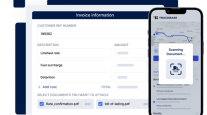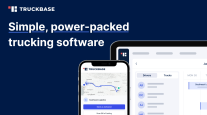Purchase of EIS Makes McLeod Software Ready to Compete for LTL Business
This story appears in the Oct. 18 print edition of Transport Topics.
McLeod Software’s purchase of Enterprise Information Solutions positions the No. 2 provider of enterprise software for motor carriers to compete for the first time for business from less-than-truckload companies — a trucking niche that appears hungry for new technology, vendors said.
“We’ve been routinely contacted by LTL carriers over the last three to five years who are looking for software,” McLeod Software CEO Tom McLeod said. “That’s been a pretty good signal that it’s an underserved market.”
The form and scope of the software used by LTL carriers today is by no means ubiquitous, but “the larger regional LTL carriers are on legacy platforms that are, by and large, internally self-maintained,” McLeod said.
McLeod Software, Birmingham, Ala., announced its purchase of LTL software specialist EIS on Oct. 11 (click here for previous story). EIS’ product will be used to create McLeod’s first dedicated dispatch and enterprise software for less-than-truckload carriers — LoadMaster LTL. The first release is due out early next year.
LoadMaster LTL will be a combination of EIS’ LTL operations product and McLeod’s suite of accounting, payroll and other back-office functions. The final release of the LoadMaster LTL will see that product fully integrated with McLeod’s truckload and brokerage software on the backend, said Tom McLeod.
Although McLeod characterized LTL carriers as “underserved” by trucking software specialists, they are by no means unserved.
TMW Systems, the No. 1 provider of off-the-shelf enterprise software for trucking companies, offers LTL dispatch and management software in the form of its TruckMate product — Windows-based software that the company got from its purchase of Maddocks Systems in 2006. Maddocks had LTL customers from the early 1990s.
TMW counts about 250 “hardcore LTL carriers” in its enterprise customer base of about 1,300 fleets, CEO David Wangler told Transport Topics.
Moreover, Wangler said, LTL carriers’ appetite for technology has only increased over the years.
Right now, “we’ve probably got a dozen people just working specifically on LTL capability in our products,” Wangler said. “LTL carriers, put another way, have been investing in technology infrastructure.”
Without quantifying, Wangler said that LTL sales on the TruckMate platform have “wildly exceeded” TMW’s expectations, and that he expects LTLs to make additional technology investments over the next two years.
TMW is McLeod’s main competitor in the arena of enterprise software for medium- to large-sized truck fleets. In terms of subscribers and revenue, it is the larger of the two companies by far, owing in part to the war chest provided by Wachovia Capital Partners, which bought the company from founder Tom Weisz in 2005.
A spate of acquisitions in the second half of the past decade, which included the purchase of Innovative Computing Corp., propelled TMW to the top spot in the truck-focused enterprise software niche. Those deals left McLeod as TMW’s only competitor of notable size.
Both companies got their start marketing software to the truckload industry but have since branched out to serve other transportation segments such as freight brokers and LTLs.
Nevertheless, McLeod and TMW’s offerings remain heavily skewed toward the truckload space. This is because, according to the companies, programming for LTL is comparatively more complex — a reflection of the data-intensive nature of moving freight for multiple shippers in a single trailer.
“The functional problem is that there are a lot of things that are different and tend to be complex,” said TMW’s Wangler.
“It’s the volume,” Wangler said. “LTL companies generate a higher transaction volume per dollar of revenue, or per truck than a truckload company.”
For McLeod, those difficulties would have been insurmountable if not for opportunistic appearance of EIS.
EIS’ software, written in the same Java programming language as McLeod’s flagship LoadMaster application, presented McLeod with the opportunity to enter the LTL software space in a matter of months rather than years.
Tom McLeod said that building LTL enterprise software from the ground up would have taken his company three years and more engineering resources than the company could spare.
“I wasn’t scouting for an LTL product by any means,” McLeod said. “I did not really expect to find a product that was very closely aligned with our technology that had a low integration threshold requirement,” he told TT in a phone interview.
Besides EIS, its book of business and about a dozen new employees — including former EIS President Marc Mitchell — McLeod also gets a new Midwestern office out of the deal: EIS’ former headquarters in Downer’s Grove, Ill.
EIS got its start as a project-based software company, taking special orders from clients in the transportation industry and then assigning a team of engineers to plan and program the desired software.
By the time founder Mitchell proposed selling his company to Tom McLeod, EIS had developed software that includes LTL freight rating, dock-scheduling, and a drag-and-drop style LTL planning board for dispatchers.
“I’m quite certain that we’re going to succeed together,” Mitchell said, “far more than EIS could do by itself.”



